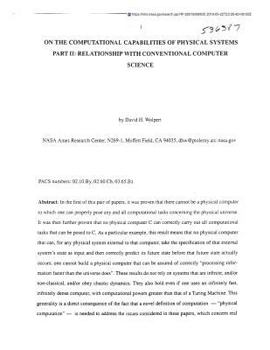On The Computational Capabilities of Physical Systems. Part 2; Relationship With Conventional Computer Science
In the first of this pair of papers, it was proven that there cannot be a physical computer to which one can properly pose any and all computational tasks concerning the physical universe. It was then further proven that no physical computer C can correctly carry out all computational tasks that can be posed to C. As a particular example, this result means that no physical computer that can, for any physical system external to that computer, take the specification of that external system's state as input and then correctly predict its future state before that future state actually occurs; one cannot build a physical computer that can be assured of correctly "processing information faster than the universe does." These results do not rely on systems that are infinite, and/or non-classical, and/or obey chaotic dynamics. They also hold even if one uses an infinitely fast, infinitely dense computer, with computational powers greater than that of a Turing Machine. This generality is a direct consequence of the fact that a novel definition of computation - "physical computation" - is needed to address the issues considered in these papers, which concern real physical computers. While this novel definition does not fit into the traditional Chomsky hierarchy, the mathematical structure and impossibility results associated with it have parallels in the mathematics of the Chomsky hierarchy. This second paper of the pair presents a preliminary exploration of some of this mathematical structure. Analogues of Chomskian results concerning universal Turing Machines and the Halting theorem are derived, as are results concerning the (im)possibility of certain kinds of error-correcting codes. In addition, an analogue of algorithmic information complexity, "prediction complexity," is elaborated. A task-independent bound is derived on how much the prediction complexity of a computational task can differ for two different reference universal physical comput
Format:Paperback
Language:English
ISBN:1723745634
ISBN13:9781723745638
Release Date:January 1
Publisher:Independently Published
Length:42 Pages
Weight:0.27 lbs.
Dimensions:0.1" x 8.5" x 11.0"
Customer Reviews
0 rating





